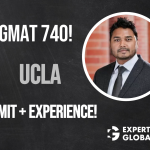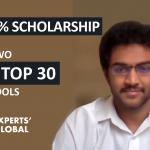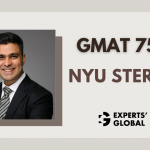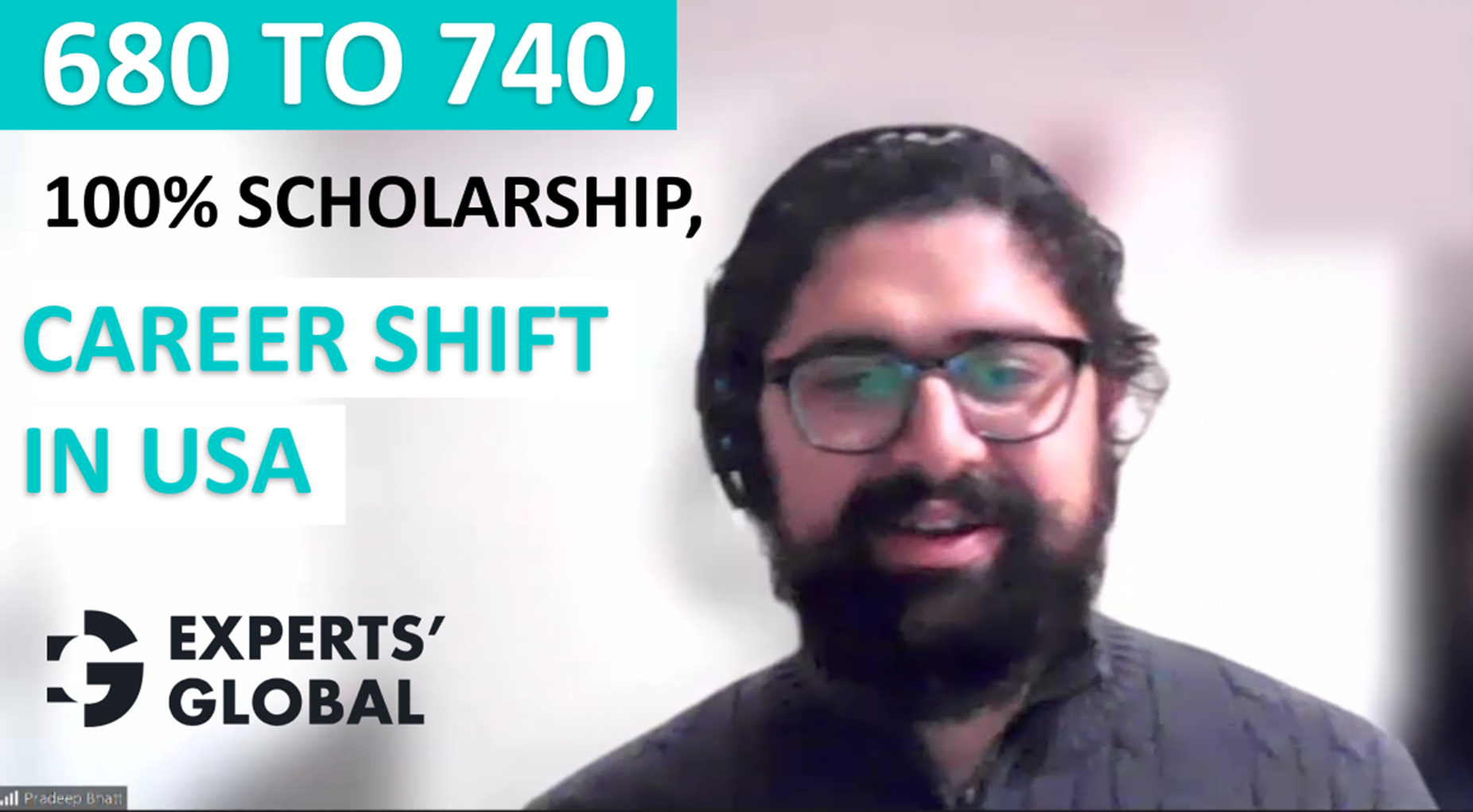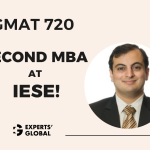Verbatim
Experts’ Global: Hi Aneesha, thank you so much for interviewing with us! Could you kindly share your story in your own words?
Aneesha: I decided to pursue the MBA after a transition from my engineering role to a business-side proposal specialist profile at work. My brother had already reached his own MBA path, and he advised me to contact Experts’ Global.
I was initially skeptical about reaching out to MBA admissions consultants, but my association with Experts’ Global was quite fluid. With their guidance, I did a deep dive into my motivations for an MBA, and learned to look at my life experiences as stories that taught a lesson. This personal exercise of introspection proved to be a balm during anxious moments in the application process, and a boost in MBA interviews. My hard work resulted in my admission to Boston University!
Experts’ Global: In your opinion, what are the factors that made the difference in your success?
Aneesha: I took the GMAT twice before I got my desired score on the third attempt. While I felt discouraged along the way sometimes, what helped me on the third attempt was keeping track of my errors during prep. Analyzing my mistakes on practice questions to isolate any flaws in my conceptual understanding helped me take the next step in terms of my preparation. Further, while studying for the GMAT, sticking to my set schedule, no matter my work or family pressures, was a help as well.
Experts’ Global: Going back to your GMAT preparation phase, what were the main resources that you used for the same and what advice will you give to future candidates regarding GMAT prep?
Aneesha: Personally, I availed myself of the Experts’ Global GMAT online preparation program. The material explaining GMAT concepts in this program covered the scope of the official guide and included other helpful insights as well. The GMAT shots offering in the program, comprising one to two-minute videos explaining a particular syllabus concept succinctly, was a unique boost to my studies as well!
Experts’ Global: What are your thoughts about mock testing? According to you, what is the frequency and number of GMAT mocks an aspirant should be taking?
Aneesha: I think that completing a series of GMAT practice tests is essential to round out your GMAT prep. GMAT mocks give you a sense of the duration of the real test, and help you establish a baseline of where you stand conceptually. One should avoid taking GMAT mocks early in one’s prep. When you are surer about your concept grasp, you can start by taking one mock a week and ramp up thereafter.
Experts’ Global: What were your lessons from managing the application timeline?
Aneesha: Managing the application timeline taught me to understand interdependencies in any project, and also to prioritize different aspects of a single undertaking.
While understanding the dependencies of the application process, I was assisted by my mentor at Experts’ Global who helped me track the varied documents and materials I needed to have ready at different points to complete my applications before their deadlines. I was also given tips on getting my recommenders to respond early and complete their share of the task on time. Being a long-winded journey, the application process can get tiring after a while, and learning to break up the process into different task buckets with different priority levels was a useful approach.
Experts’ Global: How was your interview experience with the business schools?
Aneesha: My preemptive MBA interview preparation was a lifesaver during the MBA interviews. Relying on the Experts’ Global methodology, I prepared answers to a questionnaire of the thirty most common MBA interview questions. This helped me reflect on the entirety of my experiences and frame them in an engaging way. With such an outlook, conversations during my MBA interviews became quite easy.
Experts’ Global: Can you please tell us more about your MBA experience?
Aneesha: My MBA experience was initially quite overwhelming. I went into the program with the idea that I would only take on projects as per my career goals. I never thought that I would end up working on entrepreneurial projects or health-tech interventions, and I am glad I kept an open mind to avail myself of these opportunities. While I entered the MBA targeting a career in product management, my business school experience has motivated me to pursue corporate strategy as my post-MBA domain.
My MBA experience has also taught me to not take rejections to heart. Even when I appeared for the GMAT multiple times, I tried to see my initially lower scores as a reflection of the distance I had yet to cover in my prep. This is an attitude that helped me in my job search as well, as when I failed to convert job interviews, I remained aware that there were factors beyond my control there.
Experts’ Global: Please tell us more about your job search experience during the MBA?
Aneesha: I reached out to several current students at Boston University after securing my admit, and this helped me identify mentors who offered me job-related advice even before my program started. I also learned to network effectively at this time by selling my story to others in a short period.
During the MBA, while I was initially targeting a product management role, I had the opportunity to work with an entrepreneur on a go-to-market strategy bid. Thereafter, I interned in a cybersecurity business development role. These experiences helped me revise my post-MBA goals. Overall, defining the role I wished to enter was a tough task. I read What Color is Your Parachute to help me figure out my individual value proposition, and I recommend the read to all MBA students.
Experts’ Global: Can you tell us more about your post-MBA journey? How has the entire pre-application experience as well as your MBA experience contributed to your growth post-MBA?
Aneesha: The pre-MBA phase was where I learned to network with confidence, and to manage my time well while putting in the work consistently. These lessons came in handy during my MBA job search, as I kept my morale up even through multiple rejections to keep applying for different jobs.
I learned to take the long view of my career growth, and not get dejected by the apparent failure to secure a job that I wanted. Instead, I emphasized building my network, interacting with peers from fields unknown to me, and thus building a holistic knowledge base. In due time, these lessons helped me secure my current job!
Experts’ Global: According to you, what are a few common mistakes that you would suggest all GMAT and MBA applicants avoid?
Aneesha: One of the biggest mistakes I made was to treat the GMAT like any other exam, where you master underlying concepts, and apply them to score well. I had to deal with a set timeline that created constant pressure about whether or not my prep was going well. Even when I started taking GMAT mocks regularly, starting with a free GMAT practice test, I did not take a beat to closely analyze the errors I was making, and understand whether they were due to conceptual gaps or fatigue. Try to not think too far ahead about your GMAT prep timeline, and focus on the concept or practice session that is right in front of you.
Experts’ Global: What would be your final message to all our readers?
Aneesha: Do not think about your career as a to-do list. Reach out to different people to gain from their career perspectives. In the process, you might be able to gain a new outlook on what excites you as a professional. Further, make sure to introspect after each major project you complete in the MBA. Knowing yourself and your growth intimately will give you a decided edge in selling yourself during job interviews. Lastly, try and make time for your hobbies and the things that you love, to keep your morale up!
Experts’ Global: Our deep thanks to you for sharing your experiences with us today, Aneesha!
Aneesha: No worries! Thank you too for this opportunity to reflect on my path!

